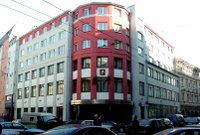 What makes a candidate stand for an election that he knows he cannot win, and in the process is destined to drift to the verge of bankruptcy? As inside information on the intense struggle leading up to the Duma elections last December is beginning to leak out, a clearer picture evolves of how political and economic power is divided in today's Russia.
What makes a candidate stand for an election that he knows he cannot win, and in the process is destined to drift to the verge of bankruptcy? As inside information on the intense struggle leading up to the Duma elections last December is beginning to leak out, a clearer picture evolves of how political and economic power is divided in today's Russia.2007 was truly an eventful year in Russia. Information on deals, negotiations, and intrigues in the ongoing process of how to divide power and resources in the country regularly floated to the surface. Most, however, remained unknown to the general public. It soon became clear that the decisive factor was not the 2008 presidential elections, but the parliamentary ones in December for the State Duma seats. Here, defending and conquering positions, not only in parliament but also in the incoming administration, was arguably a much more important process than the ongoing Chekist struggle.
One example may illustrate this. A candidate running for a loyalist opposition party in one of the
 larger contitiencies used an average of USD 1 million a week during the campaign, totalling USD 6 million in the end. However, this was merely the money the candidate in question took out of his own pocket, which also must be put in perspective of the additional money he received from other funders. What is significant is that the candidate was not even running for the power party - United Russia - and knew quite well he would never get elected.
larger contitiencies used an average of USD 1 million a week during the campaign, totalling USD 6 million in the end. However, this was merely the money the candidate in question took out of his own pocket, which also must be put in perspective of the additional money he received from other funders. What is significant is that the candidate was not even running for the power party - United Russia - and knew quite well he would never get elected.So, what makes a person spend so much money on something he beforehand knows will not result in a parliamentary seat? The question here is clearly not to succeed but merely to be in the race. For the main reason for such a candidacy is what might be acchieved in the process of running and in its aftermath. On the one hand it is a question of defending existing political and business interests, on the other to try to conquer new ground on the expense of competing interests. Needless to say, the failed candidacy resulted in an offer of a high-ranking job in the incoming administration already on the day after the elections.
Furthermore, it has become apparent that the process exemplified above has come not only to involve Russia, but also neighbouring states. Last summer, a man who for weeks had been criss-crossing the border from a neighbouring state in the end attracted
 the attention of customs authorities. Intercepting him, customs found a case containing USD 100.000 in cash. Questioning him, it turned out that the money was intended as campaign funds for a candidate in the upcoming Russian elections. By funding his candidacy, business circles in the neighbouring country hoped that he might protect their economic interests in relation to Russia. Apparently, the detainee had been smuggling equivalent sums on a daily basis for several weeks.
the attention of customs authorities. Intercepting him, customs found a case containing USD 100.000 in cash. Questioning him, it turned out that the money was intended as campaign funds for a candidate in the upcoming Russian elections. By funding his candidacy, business circles in the neighbouring country hoped that he might protect their economic interests in relation to Russia. Apparently, the detainee had been smuggling equivalent sums on a daily basis for several weeks.That great sums of money were in sway last year is quite apparent. Less attention has been given to the results of the struggle for political and economic positions. Another interesting observation is that United Russia's full-out victory may not have resulted in their absolute domination of government. In today's Russia, also loyal opposition may be rewarded if the candidate in question is sufficiently successful in defending the political and economic interests of himself and his backers. Even if United Russia nominally has next to absolute power, it seems that the party has to employ some sort of "trickle-down" system, to better reflect the actual situation rather than the one produced by the elections. Popular power is not always real power, it seems.
What is worrisome is the effects this may have for the current Russian government. Both Medvedev and Putin have underlined the importance of building
 rule of law in Russia and fighting the omnipresent malaise of corruption. However, they are put to run a power apparatus where many people have spent a lot of money to get where they are. Drained of economic resources, these people have to compensate themselves somehow to cover losses incurred. The obvious answer is to seek refuge in corruption to get back the money they have lost. Therefore, all talk of fighting the malaise seems empty, when rationality and reality among government officials assumably would result in a drastic rise in corruption.
rule of law in Russia and fighting the omnipresent malaise of corruption. However, they are put to run a power apparatus where many people have spent a lot of money to get where they are. Drained of economic resources, these people have to compensate themselves somehow to cover losses incurred. The obvious answer is to seek refuge in corruption to get back the money they have lost. Therefore, all talk of fighting the malaise seems empty, when rationality and reality among government officials assumably would result in a drastic rise in corruption.Still, this is how spoils are divided in a deceptive democracy, and
 perhaps one should not be totally moralistic when knowing that these are the realities any Russian leaders have to deal with. Even if finding Russian democracy a mere mockery of the term, one should perhaps take a closer look at such informal redistribution of power. Democracy it aint, but perhaps it is a step back from the total power of Putinism feared by the West.
perhaps one should not be totally moralistic when knowing that these are the realities any Russian leaders have to deal with. Even if finding Russian democracy a mere mockery of the term, one should perhaps take a closer look at such informal redistribution of power. Democracy it aint, but perhaps it is a step back from the total power of Putinism feared by the West. 




 Was Ukrainian President Viktor Yushchenko right to call for parliamentary elections? This is a question that in recent days has been the subject of intense debate. Constitutionally, he seems to be on the slippery slope. Still, his argument that "it is not only my right, it is my obligation" might prove valid if he acted in the spirit of the constitution as its supreme patron. The core question is though how advisable it is for state to have a constitution, which allows for such a situation to occur.
Was Ukrainian President Viktor Yushchenko right to call for parliamentary elections? This is a question that in recent days has been the subject of intense debate. Constitutionally, he seems to be on the slippery slope. Still, his argument that "it is not only my right, it is my obligation" might prove valid if he acted in the spirit of the constitution as its supreme patron. The core question is though how advisable it is for state to have a constitution, which allows for such a situation to occur.













